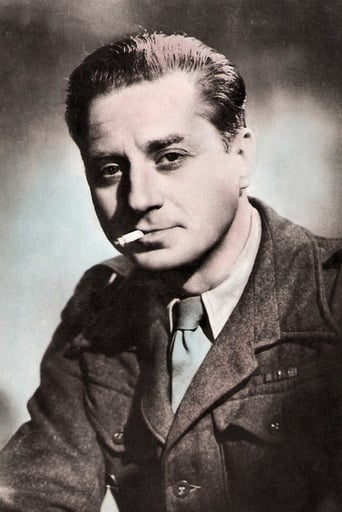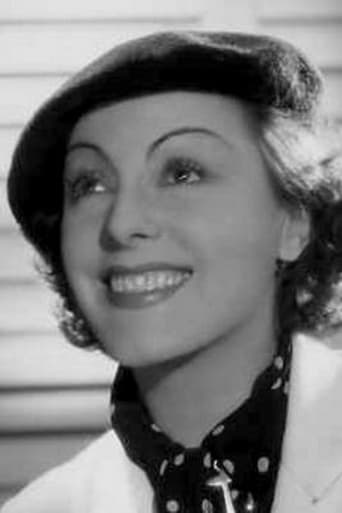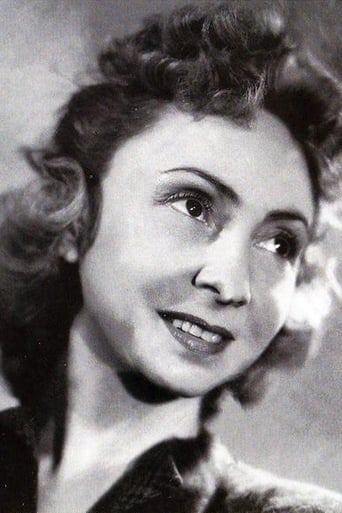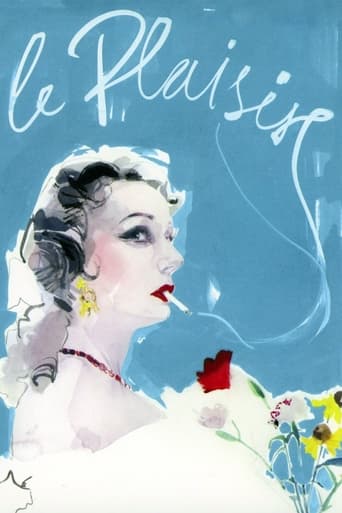
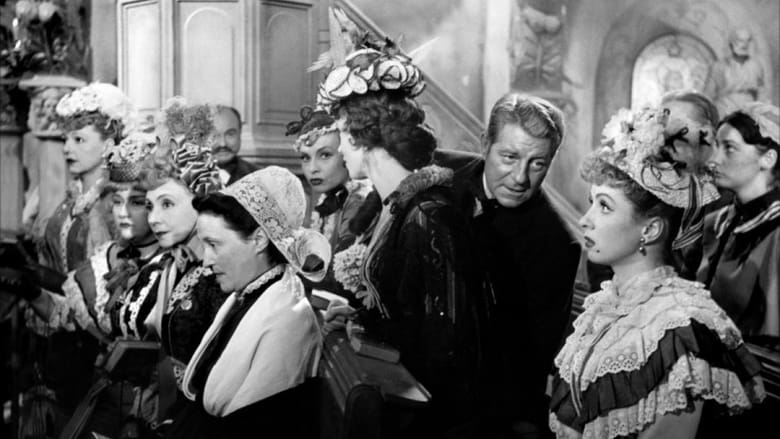
Le Plaisir (1952)
Three stories about the pleasure. The first one is about a man hiding his age behind a mask to keep going to balls and fancying women - pleasure and youth. Then comes the long tale of Mme Tellier taking her girls (whores) to the country for attending her niece's communion - pleasure and purity. And lastly, Jean the painter falling in love with his model - pleasure and death.
Watch Trailer
Cast
Reviews
Great Film overall
Like the great film, it's made with a great deal of visible affection both in front of and behind the camera.
There are moments in this movie where the great movie it could've been peek out... They're fleeting, here, but they're worth savoring, and they happen often enough to make it worth your while.
This is one of the best movies I’ve seen in a very long time. You have to go and see this on the big screen.
Max Ophuls' indulgence in mobile camera work is given its utmost fulfillment and flourish in his adaptation of three stories by popular 19th-century French writer Guy de Maupassant, considered one of the fathers of the modern short story. There is largely a rationalization for what may seem like intemperance: Ultimately, life is motion, so this continual progression is the intonation of a notion that doesn't exist in physical form. An enthusiast for immutable motion, Ophuls knew that, due to its pure texture, existence can never be entirely fulfilling, finished, or conclusively satisfied. His world is full of inextricable oppositions, a feature most overtly drawn out in the middle segment of this hilarious, melancholy amalgam. That is why, whether or not one interprets the end as a happy note, it commemorates life.One can trace, throughout the three tales, a clear-cut evolution in the women's statuses. The wife in the first story, embittered, deserted at home every night while her aging husband frolics in the nearby palais de danse in his escapist mask of youth, is completely involved in his compulsion, even content with him in her serfdom. The women of the middle episode are prostitutes in the town brothel, shown as a crucial community establishment, exercising a kind of control over men and, in the instance of Madame Rosa, beginning to spy promise free of the brothel. In the third story, the woman, acting out against the painter and lover who has retained her like a vendible, defies in the sole manner available to her.Admirable in their cleverness, rigor and craftsmanship as the surrounding segments are, it is the middle episode whose pleasure, assured by the movie's title, is most affectingly troubled by inferences, by a feeling of defeat surrounded by merriment, by underflows of dissolution. What is introductory is decidedly presented as a usual night. What follows is decidedly unusual: a night when the lights are out, the den is forsaken, and society falls apart. Within minutes, the businessmen, the town hotshots, their evening's escapade turned down, are fighting, fussing, nearly waging war. When eventually they dissolve, one straggler finds the solution, on a paper that has dropped from the door. The whole bunch has gone on a daylong trip to the country, to be at the first Communion of one of the madames' young niece. The central tale reverberates, in model, the triangular form of the film.A single transient twinkle of shared bedroom eyes is at the crux of Ophuls' arrangement of Maupassant's narrative trifecta. One might say that this lavish tragifarce is structured around it: The sole benign love match in the entire film, and indeed hopeless to attain, the categorical Ophuls love story, nipped in the bud by both an elderly wife and business priorities. Going outward from this axial bond, Ophuls gives us the two train journeys, to and from the country. Being is moving.
The screen is pitch black and we hear a voice..."I'm so happy to be talking in the dark as if I were beside you, and maybe I am." The speaker is Guy de Maupassant (voiced by Jean Marais), and Le Plaisir is three of his stories filmed by the great director Max Ophuls. The connecting thread? That pleasure, or even love, lies in how people intermingle their lives, with a shrug, assumptions, an apology, a thank you. Le Plaisir is not so much a sophisticated film of attraction and hope as it is a film of rueful wisdom. It's best to keep in mind while watching this movie that while life can be enjoyed, there are times when hope can disappear. The three stories consist of, first, La Masque. We are in 19th Century Paris at the Palais de la Dance, where great, swirling balls are held. This is a place where young women hope to find pleasure and rich men; where old women chase memories and young suitors; where prostitutes and their pimps gather, where the men are young bucks and old goats, where "rough cotton to the finest cambric" can combine. One slender man in full dinner dress rushes into the palace and begins to dance with a beautiful young woman. He prances and kicks, yet his face is like a frozen mask of youth. He collapses on the dance floor and a doctor is called. When the doctor loosens the man's clothes, he finds...well, let's say that when the man is delivered home to his wife by the doctor, she tells him a story of the battle between pleasure and love. In La Maison Tellier, we learn all about a cozy, friendly and long established brothel in a small town on the Channel coast. The bourgeois men of the town are as well-known there as they are to their wives. Then Madame decides to close her establishment for a night so that she and her girls can travel into the countryside to attend her niece's first communion. They have one or two adventures on the train. In the small village they spend the night with Madame's brother and meet the young girl. They attend the communion in the village church. They collect flowers on the way back, and are met with genuine affection and with great gaiety when Madame reopens her place of business the following night. We witness a touching story, as de Maupassant tells us, when pleasure and purity come together. Le Modele gives us a story where pleasure struggles with moral decay, where "happiness is not a joyful thing." We witness a painter and his model meet, rapturously embrace lust and, as lust tires, recrimination grows. The love which endures as the story plays out may not be most people's idea of happiness. This is a marvelously told series of stories. La Masque and Le Modele are relatively short bookends to the major tale of La Maison Tellier. With this one, it would be difficult not to become delighted and engaged with Madame and her girls and her brother. Even the puffed up townsmen are not without a sympathetic side; which man among us wouldn't mind being flattered, even for a price, by Madame's girls?
Is it possible to take one of the best tales in French literature and make a film even better out of it? Yes, it is. The tale is Maupassant's "La maison Tellier", the film-maker is Max Ophuls, the film is "Le Plaisir". In fact, the movie is divided into three episodes, corresponding to three Maupassant's tales. In the two short introducing and final stories we actually find the bitter, acid, misanthropical sarcasm typical of Maupassant's style, though softened by Ophuls' sympathy for human unhappiness. What really stuns the viewer is the central episode, the sumptuous narration of "La maison Tellier". The story is the same in the book and in the film. A bunch of prostitutes from "La maison Tellier", the brothel of a French province town, takes a day off to go to a First Communion celebration in the countryside. But what a difference of mood. The fact is that Maupassant detested and despised people, while Ophuls manifestly loves them and is always ready to forgive their faults and pettiness. Therefore the writer's aggressive satire is replaced by the director's gentle sense of humor. The brothel is closed, and we shortly realize that the balance of the town, the whole social order is upset. Some sailors start a brawl, and that looks rather expectable. But even peaceful middle-class respectable citizens, long-time friends, begin to quarrel bitterly. "La maison Tellier" is the key of social stability!Then the church-scene, a perfect blend of sweet fun and profound human feeling. Overwhelmed by the intense emotion of the First Communion Mass, the prostitutes burst in tears, and they carry all the villagers with them. I guess to have noticed a delightful nuance by Ophuls. The "beautiful Jewish girl" whom, according to the director (a Jewish himself), no brothel can afford to miss (!), at first tries to restrain herself. She's not Christian, she's not supposed to be moved! But, of course, she soon starts to weep... Great emotion, great art! And the women merged in the high grass, picking flowers... it's late, they risk to miss their train... but no! It's so a gorgeous day, let's go and pick some flowers! How poetic, how beautiful... what a fantastic scene! Needless to say, as soon as the women are back, peace, order, friendship are restored in the town.The above comments can give a partial idea of the director's extraordinary treatment of the story. But it's important to remark that just the visual beauties and the camera work by the genius Ophuls are largely enough to place "Le plaisir" among the best works in the history of cinema. Let me just mention the first scene, when we peep inside the brothel together with the outside eye of the camera, which jumps from a window to another like a little bird. That is the most brilliant cinematic idea I can remember. A perfect film forces a perfect job by the cast. And in fact the acting is magnificent."Le plaisir" is a profound study of human beings, of their joys and sorrows, an instance of superlative good taste in treating a risky theme, a triumph of clever cinematic technique. A peak of the art of cinema.
One of Max Ophuls' finest achievements,one of the best Guy de Maupassant adaptations for the screen.This is a movie made up of three sketches;it is rather a long story (la maison Tellier) framed by one prologue (le masque) an an epilogue (le modèle).Guy de Maupassant is ,by far,the best writer France as ever known,as far short stories are concerned-He wrote about 200 of them,and even influenced Dudley Nichols for the screen play of "stagecoach"(actually ,Claire Trevor was Boule de Suif)Le plaisir (the pleasure) is something fleeting,but the hero of the prologue(le masque) can't stand life is passing him by.His wife is a victim,women are often sacrified in Maupassant's work.At best they are ways for men to social advancement(Bel Ami,see "the private affairs of Bel-Ami", filmed by Albert Lewin ,1947,watchable,but which has given a totally false rendering of the conclusion),at worst ,once their lover or husband has used them ,they are often deserted (see "une vie" , directed by Alexandre Astruc,1958,which has a fine Claude Renoir cinematography."La maison Tellier" is the main body of the work:the subject is scandalous:madam and her whores close the brothel and head for the country.There,they are to attend madam's niece's communion.Max Ophuls has not always been faithfull to Maupassant:if you read the short story,you will realize how much these women are ugly,vulgar and fat;here ,we've got gorgeous Danielle Darrieux,plus Ginette Leclerc and Madeleine Renaud.Ophuls is an esthete and he could not subscribe to Maupassant's depictions.The two men come together when it comes to describe the reactions of the inhabitants of the village:the prostitutes pass for grandes dames,well educated,chic,and when they enter the church,it seems as if they enhance the religious fervor !!Maupassant,who was anticlerical to a fault,lets his irony flow;but there's compassion in Max Ophuls'pictures and I'm not sure the tears his heroines shed are that much laughable:regaining a child's soul -particularly on this communion day- is many a human being's secret longing.But cynism get the upper hand quickly and madam's brother,a bawdy Jean Gabin (the father of the little girl making her communion),is much more interested in his sister's "residents" than spiritual elevation.This second part climaxes the movie,with its steam-powered train,its banquet,its brothel of which the shutter are closed -we're only allowed to have a glimpse behind them-The movie opens and closes the same way:woman is born to be deserted when she's not a whore,like in the second sketch.Josephine (Simone Simon) will find her lover back but the price she will have to pay is terrifying.Why "le plaisir" ?Pleasure is few and far between in this world.Pleasure walks hand in hand with suffering.Guy de Maupassant himself knew fleeting pleasures he describes in part 2,but if you read his biography,you 'll meet a tormented soul,an extremely pessimistic mind,and a faux bon vivant who lived a dissipated life which ended in madness.This is one of the most absorbing,ambitious,complex and artistically successful masterwork of the French fifties.
